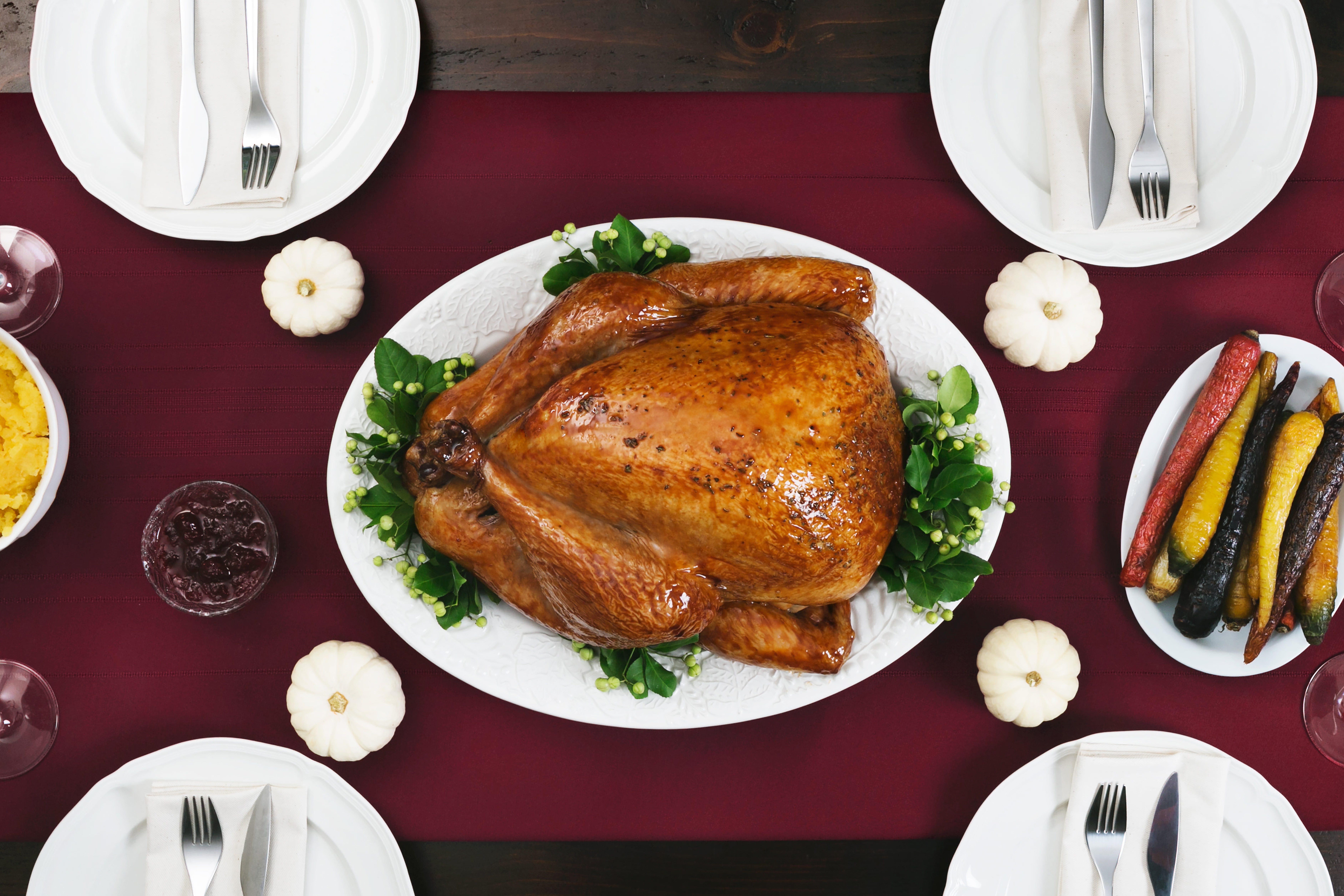
Most of us are very busy during the holidays, with friends or relatives visiting us as we cook, but we need to be mindful of where the dangers are when handling raw food, like meat and poultry.
Julie Northcutt, Clemson Food Systems and Safety Program team
The 2023 holiday season is near, and Clemson University food systems and safety agents have some tips to help keep people safe from foodborne illnesses.
Turkey is a popular entrée served for Thanksgiving and Christmas dinners, but it also is a source of possible food poisoning, such as salmonella infections. To help keep people safe, Samantha Houston, Clemson Cooperative Extension Service food systems and safety agent in Lexington, South Carolina, has a few bits of advice.
“There are at least three tasty options for cooking a holiday turkey,” Houston said. “These are roasting, smoking and frying. It is important to make sure a turkey is fully cooked before it is eaten to avoid salmonella or other bacteria-related infections.”
Bacteria can survive on foods that are not properly cooked. The color of meat and poultry does not show if it is safely cooked. Use a food thermometer to measure the internal temperature of cooked foods and cook all poultry to at least 165 F.
Properly cook stuffed turkeys

Cooking a stuffed turkey at home can be riskier than cooking one that is not stuffed. If stuffing is not thoroughly cooked, foodborne illnesses could occur. To properly stuff and cook a turkey, Houston says to:
Safely prepare the stuffing. Steps include:
- Moist and dry ingredients can be prepared separately ahead of time
- Store moist ingredients such as butter or margarine, cooked celery, onions, broth, etc., in the refrigerator.
- Both moist and dry ingredients should be combined immediately before the bird is stuffed, never in advance, even if refrigerated.
- Use only cooked ingredients, such as sautéed vegetables, cooked meats and seafood (oysters).
If eggs are used, Houston says it’s best to use pasteurized liquid eggs and not raw shell eggs. Pasteurized eggs have undergone heat treatment to kill bacteria, particularly salmonella. Raw eggs have a higher chance of having bacteria. This is “really for added insurance because heating the whole thing to 165 degrees will kill the bacteria,” she said.
Moist stuffing is better than dry stuffing as heat destroys bacteria more rapidly in a moist environment. Tips for stuffing turkey are:
- Properly stuff the bird: Loosely stuff both the neck and body cavities. Use about three-quarters cup of stuffing per pound of turkey. For example, no more than 15 cups of stuffing should be used in a 20-pound bird.
- Cook at the proper temperature: Put the stuffed turkey immediately in a preheated oven set no lower than 325 F. Cooking overnight at a low setting (200 F to 250 F) is unsafe as bacteria can easily grow under these conditions.
- Use a food thermometer: Always check the stuffing temperature to ensure it is done. Even if the turkey has reached 165 F in the innermost part of the thigh, the stuffing might not have reached 165 F in the center. All parts of the stuffing must be cooked to 165 F for safety.
If purchasing pre-stuffed whole poultry is part of the plan, Houston said to remember pre-stuffed birds are highly perishable and should only be purchased if the package includes a United States Department of Agriculture or state mark of inspection. This means the turkey has been processed under controlled conditions. Never thaw a pre-stuffed frozen bird before cooking. Always cook from the frozen state. Follow package instructions to ensure a safely cooked product.
USDA Food Safety Basics
Safe steps in food handling, cooking and storage are essential in preventing foodborne illness. Follow these four guidelines to keep food safe:
Clean—Wash hands and surfaces often.
Separate—Don’t cross-contaminate.
Cook—Cook to proper temperatures, checking with a food thermometer.
Chill—Refrigerate promptly.
More information available at USDA Food Safety Basics.
Prevent cross-contamination
When cooking poultry, Houston said it is important to prevent cross-contamination. Always wash hands thoroughly with hot, soapy water before preparing foods and after handling raw poultry. Don’t let raw poultry or juices touch ready-to-eat foods either in the refrigerator or during preparation. Don’t put cooked foods on the same plate that previously held raw poultry. Always wash utensils that have touched raw poultry with hot, soapy water before using them for cooked poultry. Wash counters, cutting boards and other surfaces raw poultry have touched.
It is best not to rinse the turkey before cooking because the rinse water could contaminate the sink and, if water is splashed, the counter and other surfaces around the sink could be contaminated as well. Cooking the turkey to a safe temperature – 165 F or hotter – kills bacteria on the surface of the turkey.
Live turkeys contain a diverse array of bacteria and other organisms on their feathers, skin, feet and intestinal tract. Of the microorganisms that make people sick, called pathogens, the most common bacteria turkeys contain in their gastrointestinal tract and on exterior surface are salmonella, campylobacter and E. coli (generic). Wild turkeys carry more bacteria than domestic turkeys.
Julie Northcutt, professor in the Clemson Department of Food, Nutrition and Packaging Sciences and a member of the Food Systems and Safety Program team, said health officials see an increase in the incidence of foodborne illness this time of the year.
In most cases, these increases in foodborne illnesses occur because people get distracted.

“Most of us are very busy during the holidays, with friends or relatives visiting us as we cook, but we need to be mindful of where the dangers are when handling raw food, like meat and poultry,” Northcutt said. “You wouldn’t want your holiday or someone else’s to be ruined by a foodborne illness, especially when they are so easy to prevent. No one should ever eat meat without properly cooking, properly holding and correctly storing it.”
The temperature range at which disease-causing bacteria grow best is called the “temperature danger zone.” This zone is between 41 F and 135 F. Northcutt said cooks will want their food to “pass through” this temperature danger zone as quickly as possible.
“This gets the food out of that temperature danger zone in a reasonable amount of time,” she said.
It is best to cool foods from 135 F to 70 F within 2 hours and then, continue cooling from 70 F to 41 F within another 4 hours for safety.
An easy way to reduce the risk of salmonellosis, or salmonella infection, and ruining a family’s holiday is to wash all surfaces touched by poultry with hot soapy water, rinse well and sanitize with a bleach solution made by mixing one scant teaspoon of regular (plain) bleach with 1 quart of water. Another option is to mix the solution in the kitchen sink, soak items for one minute, and then allow items to air dry. Sanitizer solution can be mixed in a squirt bottle, spritzed onto washed surfaces and allowed to air dry.
Turkey prices lower
People buying turkey to cook this holiday season are getting a break. Adam Kantrovich, Clemson Extension agribusiness team director, said prices for turkeys have decreased.
The price for frozen turkey is below the 3-year average. The American Farm Bureau reports the average price for an 8–16-pound turkey typically served for Thanksgiving was $1.27 per pound in August 2023, 22% lower than August 2022. The lower prices are credited to a decline in the Highly Pathogenic Avian Influenza (HPAI), which began in January 2022 affecting nearly 59 million birds in commercial and backyard flocks.
Properly store leftovers
Once everyone has eaten, most holiday tables contain leftover food. This food can be stored in a refrigerator for 3-4 days, or in a freezer for 3-4 months.
Houston said that within 2 hours of cooking, leftovers should be put in shallow containers and put in a refrigerator or freezer. Remove stuffing from the turkey and carve the meat off the bones. Divide large amounts of leftovers into small, shallow containers, no more than 2 inches deep, for quick cooling in the refrigerator.
Low-cost food options
With the price of groceries steadily rising, Julianna Lyle, Clemson Extension Rural Health and Nutrition agent for Anderson County, said many people are looking for ways to cut back. The FoodShare program offers savings and is available in most South Carolina counties. Residents living in counties that do not have the program can travel to neighboring counties to participate.
Fresh produce also can be found at local retailers and farmers markets.
HGIC Holiday Tips
This holiday season, let the Clemson Cooperative Extension Service Home and Garden Information Center (HGIC) be your guide, turning ordinary moments into extraordinary memories with a touch of culinary flair and festive elegance.
Learn how to enhance your Thanksgiving feast with expert guidance on wet and dry brining for succulent turkeys. Elevate your appetizer game with a unique twist—learn the secrets of preparing quail eggs. Venture into the realm of side dishes with a luscious mashed butternut squash recipe and don’t skip dessert! This orange gingerbread loaf with molasses brown sugar frosting is the perfect ending to your holiday meal.
HGIC is not just about the feast; it’s a hub for transforming your home into a winter wonderland. Unleash your inner decorator with tips on crafting orange pomanders, foraging for fresh winter decorations, creating a Boxwood kissing ball, choosing the perfect Christmas tree and fashioning a breathtaking magnolia wreath.
As the holiday spirit fills your home, don’t forget your beloved plants. Learn the secrets to caring for poinsettias, holiday houseplants, as well as Thanksgiving and Christmas cacti from Clemson Home and Garden Information Center experts.
-END-
Get in touch and we will connect you with the author or another expert.
Or email us at news@clemson.edu
